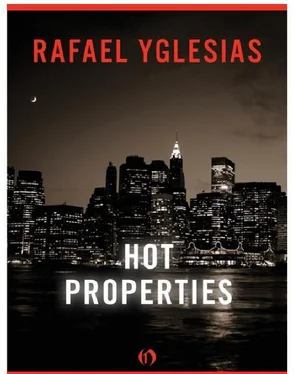Gloria Fowler looks like a greyhound, Tony Winters realized with relief. He had been frustrated in his search for a description of her: he knew he would need one when telling the story of his meeting with her to his friends. Gloria was on the phone. She had swiveled to face the window on her right (its view of a squashed Sixth Avenue and an alley of glass skyscrapers was spectacular) so that Tony saw her long flared translucent nostrils in profile. The New York sun glowed a weary red behind her and lit her nose so that he could see minute veins. Her face was gaunt, each line sharply defined. Maybe she used to be a model, he thought. Her height, her thinness, and the tasteful, casual, and yet silken appearance of her long gray skirt, creamy white blouse, and knit sleeveless vest, all spoke of fashion.
“Bill, I think we can meet about it when the revisions are in — there’s no hurry. Yes! That’s right, enjoy the sun. Leave that to me. That’s what I’m paid for. Right, you didn’t know.” She smiled brilliantly into the phone.
She is beautiful. Tony decided, as if settling a dispute, while studying her mass of red hair (dyed? he wondered) that flowed up and back, almost as if it were startled off her head by a gusting wind. She hung up and the smile dissolved into an exhausted frown. She looked at Tony with resignation. “Actors!”
“Ah!” Tony raised his hand in warning. “Remember, my mother is one of that breed.”
“Oh, your mother’s a genius. Not one of these”—she gestured at the phone—“alleged stars.” Her smile reprised: high cheeks were raised like a curtain, revealing brilliant teeth.
“William Garth?”
“Yes, one of my clients is doing a script for him and, I’m afraid, the script isn’t quite right. Bill’s not getting any younger and I suppose he can’t be blamed for worrying over whether this writer can revise it properly.” Gloria reached for a pack of cigarettes on the table and swiveled again so that her profile was against the gray wall. “I’m blabbing this for a reason.” She paused, her big brown eyes resting on him appraisingly. This meant her body was twisted away from him, her angle haughty and forbidding, rather as if she were on a throne looking over the pages for a potential knight. The cigarette — it was long, thin, and foreign — was placed in her mouth and lit in slow movements. She spoke while exhaling her first puff: “Have you done any screen-writing?”
Tony felt his buttocks tighten, his face freeze into a mask. He shook his head no, quickly realized that was an odd way to answer, and then said out loud, “No.” But his voice sounded young and tense.
“Just the plays.” She laughed. This made her hair seem particularly windblown. “Listen to me—“just the plays.’ I mean, of course, to say, your work has been exclusively for the theater?”
“I’ve written some short stories, but that’s all. Only my five plays.”
Gloria relaxed her queenly pose to lean forward. “Only? How old are you? Thirty?”
“Thirty-two.” He said this with genuine embarrassment. He felt young, too young, in her presence.
“And you’ve written only five plays?” she said, teasing.
“Well, you know, standards have been lowered. Shakespeare at thirty-two had written at least a dozen—”
“Oh, my God,” Gloria said, a hand covering her breast as if she were wounded. “You don’t judge yourself by that standard? Poor thing. I couldn’t bear to measure myself against genius—”
He knew this game. “I didn’t mean that, Gloria,” he snapped, surprising himself with his irritated tone. “I simply meant to say that writing five plays isn’t amazing, not that it isn’t an accomplishment. Of course I don’t compare myself to Shakespeare. Not unfavorably. Or favorably.” All this came out in a commanding though peevish tone. When he looked at her to see how she had reacted to it, he saw her smiling at him with a look of triumph and pleasure. He couldn’t understand why his response should delight her. He decided she must be trying to mollify him.
“Of course,” she said after a moment of gazing at him. “Were all the plays produced?”
“Yes, but only two were put on in a significant way. Youngsters at the Quest Guild and another production in the Harold Repertory in Chicago. The other productions aren’t worth talking about.”
“Gosh, I’ve never heard anyone dismiss credits, no matter how awful.”
“Well …” He considered explaining, but instead he summarized: “I know those credits don’t mean anything in the real world.”
Gloria raised her eyebrows (they were dramatic and arched even when at rest) and stared.
Tony laughed. “What?”
“Now I understand where that toughness comes from in Youngsters. I saw it last summer and loved it.”
“Thank you.”
“I felt there were problems with the production. I don’t think it did you justice. That girl, uh, the one with the funny face …”
“Lonnie Kane? I love her work. I thought—”
“No, no. She was marvelous. We represent her. She got some of the underpinnings in your play — I could hear strength in her. That’s what makes your humor so compelling. You’re not doing one-liners.”
“Thank you. I didn’t know you represented Lonnie. What’s she doing now?”
“She’s been swallowed up by sitcom pilots that don’t quite make it.”
Tony laughed. “The Jaws of acting.”
Gloria frowned. “Well, she’ll hit with one. Tell me, why haven’t you tried screenwriting?”
“I’ve thought about it. I guess I worry about dealing with Hollywood. Because of my mother I do have bad associations with it.”
“New York’s coming back, you know. More and more projects are originating and even being produced here. I’m not sure that you’d have to even visit Hollywood while doing screenwriting.”
“I didn’t mean that kind of bad association with Hollywood. It isn’t geography — it’s the profession.”
Gloria again smiled that broad toothy grin — what was it? Tony wondered. Triumph? A secret knowledge? “I thought you might mean that,” Gloria said. “I can imagine what those years out there with your mother must have been like.”
“Yeah, it wasn’t too much fun for Mom, thinking she was about to be thrown into a concentration camp.”
“But you were a baby when all that was happening.”
“Yes, but the effect on me was still quite lasting.” Tony laughed hollowly and instantly felt stupid that he had. He sounded as if he were being coy about the McCarthy Period, as it was referred to by his mother and her friends. The McCarthy Period, with capitals to aid the sense of dread and tackiness, sort of a slapstick Hitler. But it only seemed farcical in retrospect. At the time, with people losing their jobs, committing suicide, with the Rosenbergs dying in the electric chair, there was little of the low comedy that now remains when seeing those black-and-white TV hearings; little of the idiotic spectacle of matinee idols proclaiming their devotion to America and their loathing of “communist infiltration” of show business. “It wasn’t fun,” he said in a low voice, thinking of all it had cost his family: the divorce, the paralysis of his mother’s career, her breakdown, his father’s panic and immoral behavior. Everything else in the history of his family was a flat terrain compared to the volcanic and geological monstrosities of the McCarthy Period.
In college, Tony had used this family history to bed women, wooing with sentiment, making drama and romance out of the real pain and stupidity of his parents. He had corrupted his feelings and now suspected himself of fraud whenever he called attention to them, as if he were shoplifting from the store of his past, cheating the cash register of genuine feeling, selling the coinage of his soul.
Читать дальше












